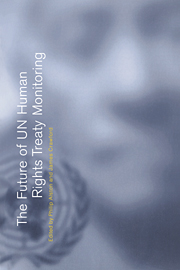Book contents
- Frontmatter
- Contents
- List of Tables, Figure, Appendices
- Notes on Contributors
- Editors' Preface
- Table of Treaties
- Table of Cases
- List of Abbreviations
- 1 The UN human rights treaty system: A system in crisis?
- A The UN human rights monitoring system in action
- B National influences and responses
- 9 Making human rights treaty obligations a reality: Working with new actors and partners
- 10 Domestic implementation of international human rights treaties: Nordic and Baltic experiences
- 11 The domestic impact of international human rights standards: The Japanese experience
- 12 The role of human rights treaty standards in domestic law: The Southern African experience
- 13 Uses and abuses of the treaty reporting procedure: Hong Kong between two systems
- 14 The United States and the international human rights treaty system: For export only?
- C Regional and sectoral comparisons
- D Common challenges for the treaty bodies
- E Looking to the future
- Index
11 - The domestic impact of international human rights standards: The Japanese experience
Published online by Cambridge University Press: 23 December 2009
- Frontmatter
- Contents
- List of Tables, Figure, Appendices
- Notes on Contributors
- Editors' Preface
- Table of Treaties
- Table of Cases
- List of Abbreviations
- 1 The UN human rights treaty system: A system in crisis?
- A The UN human rights monitoring system in action
- B National influences and responses
- 9 Making human rights treaty obligations a reality: Working with new actors and partners
- 10 Domestic implementation of international human rights treaties: Nordic and Baltic experiences
- 11 The domestic impact of international human rights standards: The Japanese experience
- 12 The role of human rights treaty standards in domestic law: The Southern African experience
- 13 Uses and abuses of the treaty reporting procedure: Hong Kong between two systems
- 14 The United States and the international human rights treaty system: For export only?
- C Regional and sectoral comparisons
- D Common challenges for the treaty bodies
- E Looking to the future
- Index
Summary
Introduction
A prominent feature of contemporary international law is the growing interaction between international law and national law, and the area of human rights is no exception. Since the end of the Second World War, numerous treaties on human rights have been concluded and they have had significant impact on the domestic law of the contracting parties. International organisations, especially the United Nations, have adopted not only conventions but also declarations, standards, and principles on human rights. Although the latter are not binding on states, they often elaborate on the provisions in the conventions or further elucidate human rights principles. Human rights conventions often set up committees, commissions or courts to monitor their implementation by the contracting parties. These organs are ‘international organisations’ in a broad sense, and they perform more and more ‘acts’ of a legal character in discharging their monitoring functions. These acts may be judgments of courts of human rights, or more informal acts of monitoring bodies, such as decisions, reports, general comments, comments or views. In addition to the human rights conventions themselves, these acts have had a significant impact on the domestic law of states. While their impact within the framework of the European system for the protection of human rights has been extensively analysed, insufficient attention has been paid to their impact outside Europe. In particular, the subject has been all but neglected in Japan. The purpose of this chapter, then, is to analyse the domestic impact of acts of international organisations relating to human rights, with a focus on recent developments in Japan.
- Type
- Chapter
- Information
- The Future of UN Human Rights Treaty Monitoring , pp. 245 - 268Publisher: Cambridge University PressPrint publication year: 2000
- 3
- Cited by



